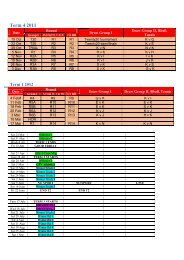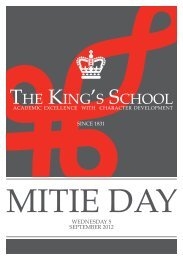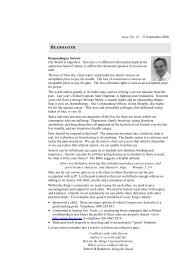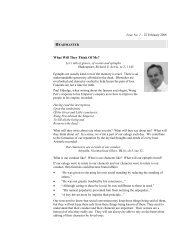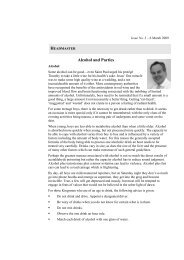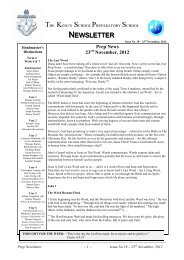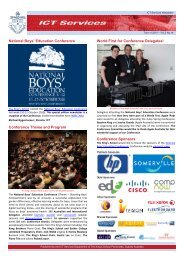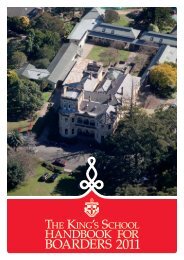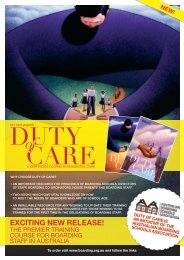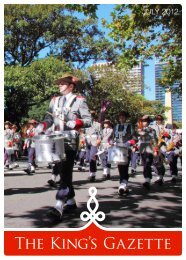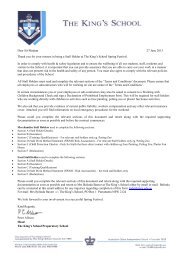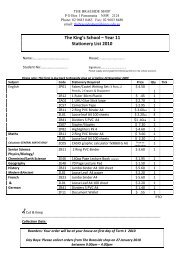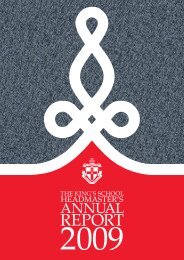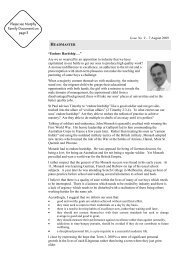Create successful ePaper yourself
Turn your PDF publications into a flip-book with our unique Google optimized e-Paper software.
DIRECTOR OF STUDIES<br />
Curriculum Matters<br />
Academic Tips <strong>No</strong>. 5<br />
Why do I need to study<br />
Over the last few years, I have spent some of my<br />
‗spare‘ time reading and researching about the<br />
Battle of Fromelles (July 19-20, 1916) where<br />
Australians fought for the first time on the Western<br />
Front and suffered the worst casualties in a single<br />
day – 5,533 casualties! Why study this event What<br />
do we learn from it Why do we remember it We<br />
were fortunate on the first day of this term to have<br />
Lambis Englezos address the <strong>School</strong> about his<br />
thoughts as to why we remember, not glorify, the<br />
actions of soldiers in war – Lambis was<br />
instrumental in researching and locating the ‗lost<br />
diggers‘ of Fromelles, buried at Pheasant Wood in<br />
Fromelles by the Germans and where last year over<br />
200 were reburied with dignity in the new<br />
Commonwealth War Grave. This included the<br />
identification and reburial of Lt Robert Burns<br />
(whose memorial lies in the heart of the <strong>School</strong>)<br />
lost at the Battle of Fromelles.<br />
For me, as a teacher and a parent, it arouses interest<br />
and philosophical questions which after nearly 100<br />
years gives some kind of closure. To study is a<br />
lifelong pursuit - but what interest does this have<br />
for our students at school today It is probably<br />
more like this…<br />
Well, here I am again. My History teacher is<br />
speaking to the class and I have some stuff written<br />
down. Does any of it make sense My biggest<br />
problem is writing legibly. Writing so I can read it<br />
is the important thing. Organising my notes and<br />
making sure that each event and issue is on each<br />
paper could help reduce the infamous "eh... what<br />
was this for again"<br />
Let‘s have a look at how this may be improved –<br />
not just for History but for all subjects. In some<br />
courses, the best way to study is to re-write the note<br />
immediately after taking them. It sounds crazy but<br />
trust me, it will stick in your mind a lot more.<br />
Another important factor in effective note-taking is<br />
sifting through all of the unimportant stuff the<br />
teacher throws out there. <strong>The</strong>re are key words you<br />
should listen for and write down including, but not<br />
limited to: names, dates, places, and importance to<br />
the subject. Finally, it is important to read the<br />
assigned reading before coming to class. This is<br />
because if you read before class you will have a<br />
better grasp of what the teacher is speaking about<br />
when the time comes.<br />
Why study<br />
To put it simply, the reason we need to study is<br />
because studying is planned learning that can<br />
enrich your life and can help you achieve whatever<br />
goals you have. <strong>The</strong> more you know, the more you<br />
can do. We learn what we want to know via our<br />
senses (mostly seeing [visual] and hearing [aural].<br />
<strong>The</strong> most important thing about studying is your<br />
attitude.<br />
If you do want to learn, think positively.<br />
You have to be alert and focused to get the most<br />
out of every situation.<br />
You need to be able to plan ahead and anticipate<br />
deadlines – don‘t leave everything to the last<br />
minute.<br />
Top Study Tips<br />
1. What do you want to know INFORMATION<br />
2. Why do you need to know it MOTIVATION<br />
3. What do you need to do APPLICATION<br />
4. Why do you need to do it INSPIRATION<br />
5. How can I remember it REITERATION<br />
Here‘s my suggestion: make a copy of these<br />
questions and terms and keep a copy of them where<br />
your son studies. When he gets stuck, start at the<br />
top. When he has finished his work, check to see if<br />
he has applied the first four questions. Sometimes it<br />
is worthwhile working with someone or in a group<br />
for Question 5 to really confirm that one –<br />
accountability!<br />
Everyone gets stuck studying at some time.<br />
Sometimes it has nothing to do with the ability to<br />
organise content. That‘s why we all need to stop<br />
and rethink as sometimes we just get lost in the<br />
information.<br />
Why not give it a go<br />
National Assessment Program<br />
Literacy and Numeracy (NAPLAN)<br />
Year 7 and 9 students will be sitting these tests<br />
from Tuesday to Thursday, 10-12 May.<br />
Additional information about the National<br />
Assessment Program can be found at:<br />
http://www.naplan.edu.au/verve/_resources/NAPL<br />
AN_2011_Parents_Brochure.pdf<br />
<strong>The</strong>se forms are available from Mrs Williams in the<br />
ESS Department contacting her on 9683 8550.<br />
<strong>The</strong> <strong>King's</strong> Herald Page 8 <strong>Issue</strong> <strong>No</strong>. 5 – 6 May 2011



